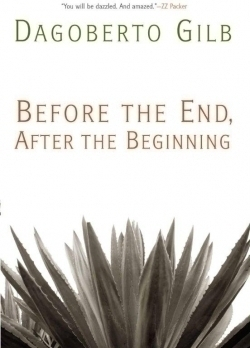Before the End, After the Beginning
The quote is well-worn: “It’s the journey that matters.” Dagoberto Gilb’s appropriately titled new collection—*Before the End, After the Beginning—*gives us ten such adventures. And Gilb should know a thing or two about journeys, having written most of these stories over the months he recovered after a stroke.
“please, thank you,” the first in the collection, is the story of a man in the hospital crawling back to life after a stroke. The grammar itself takes a most basic form—no capital letters, no apostrophes. The narrator’s perspective, as a stroke victim, is reliably unreliable: “so i started not answering, ignoring them back, or yelling at them. maybe yelling is what I was doing in my mind. maybe muttering under my breath is what I did.” Over the course of the story, the narrator moves from intensive care to a shared room to various therapies—all preparing for a return home, which is both a relief and a realization: “i am a name, just another, one they think is foreign even, when there are so many hurting. a process of recovery that is simply what happens within hospital walls: i want to say thank you to all of them, even though theyd forget in sixty seconds. were all moving onward. tomorrow someone else is here.”
The collection ends with “Hacia Teotitlan”—the story of a man coming home to die. Ramiro Areyzaga returns to Mexico, a place he hasn’t visited since he was seven. There is much to be remembered. Most poignantly, “the church, like none he’d ever seen since, all the cool stone space, and God—which he never got over, so much so it stayed inside him, quietly, the rest of his life, like it was the word Mexico itself.” His rented room—a basement apartment—is its own sort of tomb, but one that allows him pastries and newspapers and walks, one that allows him to make peace with what will come next.
The stories between these two powerful bookends represent other kinds of journeys—men hard on their luck, looking for fresh starts; men who have started over but may never fully sever the past from the present; young boys who are just beginning to open their eyes to the ways of the worlds they inhabit. Explains the cop in “Blessing:” “You were born. Until you die, the rest is on you. I’m just doing my job.” The journey is up to us.
Gilb lives in Austin, Texas, and is the author of several books, including The Flowers, Gritos, and Woodcuts of Women.
Reviewed by
S. Hope Mills
Disclosure: This article is not an endorsement, but a review. The publisher of this book provided free copies of the book to have their book reviewed by a professional reviewer. No fee was paid by the publisher for this review. Foreword Reviews only recommends books that we love. Foreword Magazine, Inc. is disclosing this in accordance with the Federal Trade Commission’s 16 CFR, Part 255.

